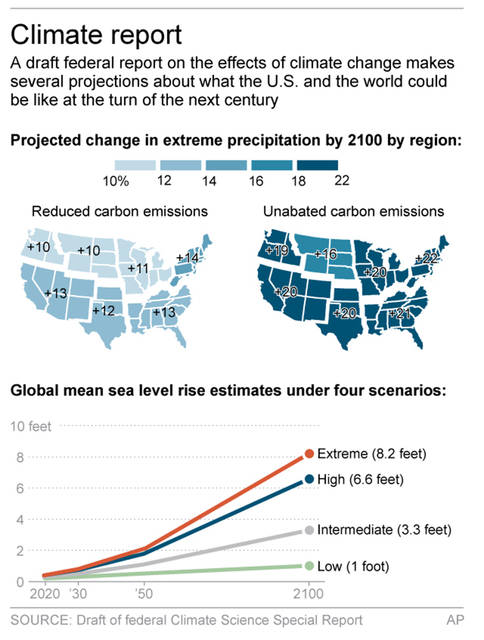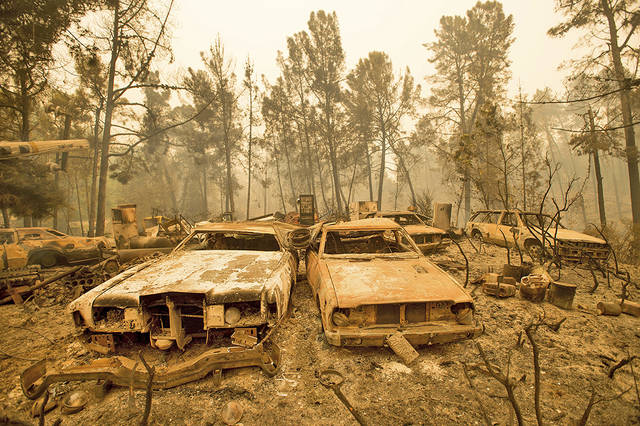WASHINGTON — As President Donald Trump touts new oil pipelines and pledges to revive the nation’s struggling coal mines, federal scientists are warning that burning fossil fuels is already driving a steep increase in the United States of heat waves,
WASHINGTON — As President Donald Trump touts new oil pipelines and pledges to revive the nation’s struggling coal mines, federal scientists are warning that burning fossil fuels is already driving a steep increase in the United States of heat waves, droughts and floods.
It is the latest example of collisions between Trump’s environmental policies and the facts presented by his government’s experts.
Contradicting Trump’s claims that climate change is a “hoax,” the draft report representing the consensus of 13 federal agencies concludes that the evidence global warming is being driven by human activities is “unambiguous.” That directly undercuts statements by Trump and his Cabinet casting doubt on whether the warming observed around the globe is being primarily driven by man-made carbon pollution.
“There are no alternative explanations, and no natural cycles are found in the observational record that can explain the observed changes in climate,” says the report, citing thousands of peer-reviewed studies. “Evidence for a changing climate abounds, from the top of the atmosphere to the depths of the oceans.”
Faced with reams of evidence compiled by federal scientists that conflicts with their policy positions, Trump and his advisers frequently cite the work of industry-funded think tanks. Environmental Protection Agency Chief Scott Pruitt and Energy Secretary Rick Perry have championed the formation of a “red-team, blue-team” exercise where climate-change skeptics would publicly debate mainstream climate scientists.
Submitted as part of the upcoming National Climate Assessment, the draft federal report sends the overriding message that failing to curb carbon pollution now will exacerbate negative consequences in the future. That assessment calls into question the wisdom of Trump’s environmental and energy policies, which seek to boost U.S. production and consumption of fossil fuels even as the world’s other leading economies promote cleaner sources of energy.
An early version of the report, a copy of which was obtained by The Associated Press, was distributed widely in December for review by leading scientists. The New York Times published a copy Monday.
The U.S. Global Change Research Program, which will edit and produce the final climate report, did not respond to phone calls and emails seeking comment on Tuesday.
White House press secretary Sarah Sanders criticized the Times for reporting on the draft document “without first verifying its contents with the White House or any of the federal agencies directly involved with climate and environmental policy.”
She then declined to comment on the report.
“The White House will withhold comment on any draft report before its scheduled release date,” Sanders said.
The assessment has generally been released every four years under a federal initiative mandated by Congress in 1990. The current draft for 2018, targeted for release later this year, largely builds on the conclusions of the 2014 assessment released under the Obama administration.
The assessment said global temperatures will continue to rise without steep reductions in the burning of fossil fuels, with increasingly dire effects on the lives of every American.
Worldwide, 15 of the last 16 years have been the warmest years on record. Today, the National Oceanic and Atmospheric Administration said 2017 is on track to be the second warmest for the United States.
Scientists from all over the world have documented warming in the air and water, melting glaciers, disappearing snow, shrinking sea ice and rising sea level. The report said the United States will see temperature increases of at least 2.5 degrees over the next few decades, even with significant cuts to carbon pollution.
Even if humans stop spewing heat-trapping gases today, the world will warm another half a degree, the report said, citing high confidence in those calculations. Scientists, such as Stanford University’s Chris Field, say that even a few tenths of a degree of warming can have a dramatic impact on human civilization and the natural environment.




